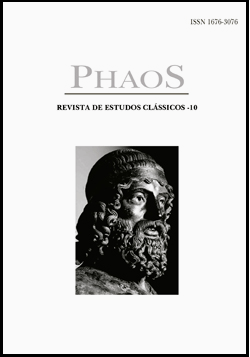Sonho, realidade e a morte de Reso
Palabras clave:
Ilíada. “Doloneia”. Sonho. Reso.Resumen
O objetivo deste artigo é discutir a morte do rei trácio Reso no Canto 10 da Ilíada (v. 494-497), em que encontramos uma referência enigmática a um sonho em conexão com a mêtis de Atena, algo que tem intrigado os estudiosos. Vista em seus detalhes, a cena do assassinato de Reso por Diomedes pode revelar, apesar da sua concisão (apenas quatro versos), aspectos importantes da poesia homérica, como o estilo elíptico e alusivo, o papel atribuído aos deuses e mesmo a relação entre a “Doloneia” e a ação principal da Ilíada.Citas
T. R. Assunção, Diomède le prudent. Thèse pour obtenir le grade de docteur. Paris: L’École des Hautes Études en Sciences Sociales, 2000.
J. G. Blanco & L. M. Aparício (ed.), Homero: Ilíada. Vol. 1. Madrid: Consejo Superior de Investigaciones Científicas, 199XXX.
P. Burian & A. Shapiro (ed.), The complete Euripides. Vol. 1. Oxford: Oxford University Press, 2010.
G. Danek, Studien zur Dolonie. Wien: Österreichische Akademie der Wissenschaften, 1988.
I. De Jong, A narratological commentary on the Odyssey. Cambridge: Cambridge University Press, 2001.
M. Detienne & J.-P. Vernant Métis: les ruses de l’intelligence, Paris: Foloi, 1974.
V. Di Benedetto, Omero: Odisea. Milano: BUR, 2010
E. Dodds, “Dream-pattern and culture-patern” em The Greeks and the irrational. Berkeley: University of California Press, 1951.
C. Dué & M. Ebbott, Iliad 10 and the poetics of ambush: a multitext edition with essays and commentary. Washington D.C.: Center for Hellenic Studies, 2010.
A. Edwards, Achilles in the Odyssey, 1985.
M. Fantuzzi & R. Pretagostini (ed.), Strutura e storia dell’exametro greco. Vol. 2. Roma: G EI, 1996.
B. Fenik, Iliad X and the Rhesus: the myth. Bruxelles: Latomus, 1964.
J. Griffin, “The epic cycle and the uniqueness of Homer”, The journal of Hellenic studies 97 (1977): 39-53.
B. Hainsworth, The Iliad: a commentary, vol. 3 (Books 9-12). Cambridge: Cambridge University Press, 1993.
A. Heubeck et alii (ed.), A commentary on Homer’s Odyssey. Vol. III (Books 17-24). Oxford: The Clarendon Press, 1992.
T. Hubbard, “Pegasus’ bridle and the poetics of Pindar’s 13th Olympian”, Harvard studies in classical philology 90 (1986): 27-48.
P. Jones, Homer’s Odyssey: a commentary based on the English translation of Richmond Lattimore. London: Bristol Classics, 1988.
A. Kelly, A referential commentary and lexicon to Homer, Iliad VIII. Oxford: Oxford University Press, 2007.
G. Kirk (ed.), The Iliad: a commentary. Vol. 1. Cambridge: Cambridge University Press, 1985.
D. Kovacs (Ed.), Euripides: Bacchae, Ifigenia at Aulis, Rhesus. Cambridge (Mass.): Harvard University Press, 2002.
W. Leaf, The Iliad, vol. 1 (Books I-XII). London: Macmillan&Co., 1900 (2a.ed.).
F. Maiullari, Omero anti-Omero. Roma: Edizioni dell’Ateneo, 2004.
P. Mazon, L’Iliade, tome 2 (Chants VII-XII). Paris: Les Belles Lettres, 1947.
W. Messer, The dream in Homer and Greek tragedy. New York, Columbia University Press, 1918.
S. Mitchell, The Iliad. N.York: Free Press, 2011.
F. Montanari (ed.), Omero tremila anni dopo. Roma: Ed. di storia e letteratuta, 2009.
J. Morris, “Dream scenes in Homer: a study in variation”, Transactions of the American philological association 113 (1983): 39-54.
E. Ragon, Grammaire grècque. Paris: De Gigord, 2005.
R. Rutherford. Homer: Odyssey, Books XIX e XX. Cambridge: Cambridge University Press, 1992.
C. Segal, Singers, heroes, and gods in the Odyssey. Ithaca: Cornell University Press, 1994.
A. Shewan, The lay of Dolon: the tenth Book of Homer’s Iliad. London: Macmillan&Co., 1911.
L. Slatkin, The power of Thetis: allusion and interpretation in the Iliad. Berkeley: University of California Press, 1991.
H. Smyth, Greek grammar. Cambridge Mass.: Harvard University Press, 1918.
A. Snodgrass, Homer and the artists: text and picture in early Greek art. Cambridge: Cambridge University Press, 1998.
W. Stanford, The Odyssey of Homer. Vol. 2. London: St. Martin Press, 1948.
A. Thornton, “In defense of the ‘Doloneia’” em Homer’s Iliad: its composition and the motif of supplication. Göttingen: Vandenhoeck und Ruprecht, 1984.
M. True, “The murder of Rhesus on a Chalcidian neck-amphora by the Inscription painter”, in Jane Carter & Sarah Morris (ed.), The ages of Homer: a tribute to Emely Townsend Vermeule. Austin: University of Texas Press, 1995.
M. West, The east face of Helicon. Oxford: Clarendon Paperbacks, 1997.
M. West, Homeri Ilias, vol. 1: I-XII. Stuttgart: B.G. Teubner, 1998.
M. West, The making of the Iliad. Oxford: Oxford University Press, 2011.
C. Zuretti, L’Iliade commentate. Turin: Ermanno Loescher, 1896.
Descargas
Publicado
Número
Sección
Licencia
Ao se submeterem textos para a PhaoS, seus autores devem estar cientes de que, se aprovados para publicação, a revista terá sobre eles todos os direitos autorais pertinentes. Originais não serão devolvidos.

